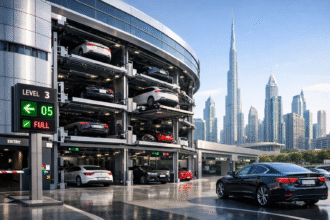Recognizing the signs of engine overheating is crucial, as it may indicate an underlying issue that requires immediate attention. Ignoring this problem led to significant damage to the engine.
In a high-temperature environment like the United Arab Emirates, where heat, dust, and sand can exacerbate the issue, it’s crucial to know what to do when your car overheats to prevent severe engine damage. This article will explain what to do if your automobile overheats and breaks down.
Typical Reasons for Car Overheating
A car may overheat for several reasons, including engine problems and malfunctions in the cooling system.
Low Levels of Coolant
Coolant, often referred to as antifreeze, helps regulate engine temperature by absorbing heat and dissipating it through the radiator. The coolant will not function properly if it is low due to a leak or evaporation, which can cause the engine to overheat.
A Malfunctioning Thermostat
The heating element regulates the coolant flow to maintain a steady engine temperature. A malfunctioning thermostat may become trapped in either the closed or open position, which would hinder the normal circulation of coolant.
It is essential to replace a faulty thermostat to avoid overheating and ensure optimal engine performance.
Problems with the Radiator
Through the release of heat from the coolant, the radiator is responsible for cooling the engine. Overheating may result from the radiator’s inability to adequately cool the engine due to obstructions, damage, or a leaky hose.
Frequent radiator maintenance can help avoid major overheating problems. This includes draining the radiator and looking for leaks.
A Malfunctioning Water Pump
Inappropriate coolant flow from a faulty water pump may result in engine overheating. Promptly replacing a malfunctioning water pump can help avoid severe engine damage and overheating. The engine won’t have to work as hard if you get your AC system inspected and repaired by a professional car AC repair provider in Dubai.
Clogged Cooling Fans
Cooling fans force air through the engine and radiator to help control the temperature. The motor might quickly overheat if the fans cease functioning due to an electrical problem, a blown fuse, or a malfunctioning relay.
During routine maintenance, have your cooling fans inspected and fixed to help avoid engine overheating.
Solutions for Overheating Engines
Make a Safe Stop
When you notice any unusual engine vibration, steam from the hood, or a rising temperature gauge, it’s crucial to act immediately. Pull over to a safe spot, turn off the engine to prevent damage, and keep an eye on your engine’s temperature gauge for any early warning indicators, such as the engine light.
Verify the Coolant Levels
Check the engine oil reservoir once the engine has cooled. Fill it up with the suggested coolant if it’s low. Because it can result in burns, never remove the radiator cap when the engine is hot. Preventing overheating requires maintaining the proper coolant level.
Look for Leaks
Check the car’s undercarriage for any noticeable coolant leaks. It is better to contact a professional or a car engine repair in Dubai for a coolant leak. Engine overheating is often caused by radiator leaks, which need to be addressed immediately.
Examine the Fans and the Radiator
Ensure the cooling fans are operating correctly and that the radiator isn’t clogged. A malfunctioning fan motor or an electrical problem could be the cause of the fans’ inability to spin. A blockage in the radiator can seriously affect the cooling system of your engine.
Switch Out the Thermostat
It could be necessary to replace the thermostat if it is stuck. During an engine repair service, a mechanic can swiftly diagnose and replace it.
Examine the Water Pump
A malfunctioning water pump frequently results in overheating. It’s time for a replacement if you hear strange sounds or see coolant leaks close to the pump.
Keep your Oil Levels in Check
Check and replenish your engine oil regularly. Engine cooling and friction reduction are two benefits of clean oil. You may require engine oil leak repair if you notice regular dips in your oil level. If you haven’t had your car’s oil changed in a while, consider scheduling an appointment to have it done.
Address Other Issues
Engine overheating occasionally has a connection to other automotive issues. For example, a cracked windscreen might impact the cooling efficiency and aerodynamics of your vehicle. As part of your general car maintenance, consider replacing the windshield if you notice any issues.
Prevention is the Cure
Regular auto maintenance, typically every 5,000 kilometers in the United Arab Emirates, is a crucial step in preventing overheating, especially during the scorching summer months. This proactive approach ensures proper air circulation, maintains coolant levels, and keeps filters clean or replaced, all of which are vital for preventing overheating.
Delaying your vehicle’s servicing can lead to significantly higher long-term costs for recovery and repairs. Worse, you might find yourself stranded under the scorching August midday sun. To avoid these scenarios, make an appointment for your servicing now and keep your vehicle in top condition.
FAQs: Normally People Asked
1. What are some signs that my car’s engine needs work?
Some common signs are:
- Noises from the engine that are not normal, like knocking, ticking, or grinding
- The engine is smoking or getting too hot.
- Leaks of oil or coolant
- The check engine light is on.
- Stalling, rough idling, or bad acceleration
- Less efficient use of fuel
Taking care of these problems right away can stop more damage and expensive repairs.
We Fix Cars
2. How often should I get my car’s engine serviced in Dubai?
You should have your engine checked at least every 10,000 kilometers or as your manufacturer says. Regular maintenance helps find problems before they get worse and keeps the engine running at its best.
Talk Tackle
3. What does a normal engine repair service do?
Comprehensive engine repair services usually include:
- Testing for problems with advanced tools
- Changing the oil and filter in the engine
- Check the timing belt or chain
- Check the spark plugs and the ignition system
- Check the coolant system
- Check the cylinder head and valve
- Cleaning and tuning engine parts
Good service centers give you clear information about their repairs and do thorough diagnostics.
germancarsexpert.com
4. What is the cost of fixing an engine in Dubai?
The cost of repairs depends on how complicated the problem is, what kind of car it is, and what parts are needed. For example, small repairs might cost between AED 500 and AED 1,500, while big repairs could cost AED 3,000 to AED 10,000 or more. Before starting repairs, it’s a good idea to get a detailed estimate.
doctocars.com
5. Should I fix or replace the engine in my car?
If the engine is badly broken or has a lot of miles on it, it might be cheaper to replace it. But if the damage is only in one place, fixing or rebuilding it can make it work again for less money. Talking to a mechanic you trust can help you figure out what to do next.
dubizzle.com
6. Is it possible to fix my car’s engine without going to the shop?
Some service centers in Dubai will pick up and drop off your car for free when you need engine repairs. This makes things easier for customers. When you make your appointment, you should ask about these kinds of services.
germancarsexpert.com
7. How long does it take to fix an engine in Dubai?
The time it takes to fix things varies:
- Small repairs take 1 to 2 days.
- Big changes take 5 to 10 days.
- 7 to 14 days for engine replacements
Parts availability, the amount of work in the workshop, and the type of repair needed all affect how long it will take.
Reddit
8. What kinds of engines can be fixed in Dubai?
Dubai’s workshops work on a wide range of engines, such as:
- Engines that run on gas and diesel
- Engines for electric and hybrid cars
- Engines that are high-end and powerful (like those from BMW, Mercedes-Benz, Audi, and Porsche)
Specialized centers usually have the knowledge and tools to work on different kinds of engines.
germancarsexpert.com
Conclusion
If left unaddressed, overheating is a serious problem that can lead to costly engine repairs or even total engine failure. You can maintain your car’s ideal operating temperature by being aware of the primary causes and implementing preventative measures. Regularly maintaining the radiator, water pump, thermostat, and hoses will help prevent overheating issues.





